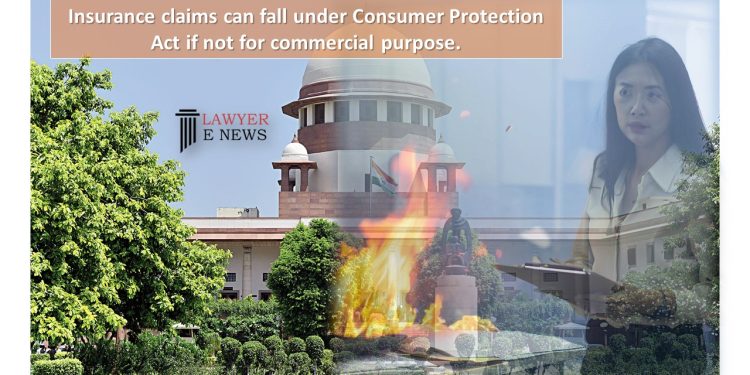Insurance claims can fall under Consumer Protection Act if not for commercial purpose: Supreme Court

On 13 April 2023, Supreme Court, in a Landmark Judgement NATIONAL INSURANCE CO. LTD. Vs. HARSOLIA MOTORS AND OTHERS, observed that the Act applies to consumers who purchase goods or avail services for non-commercial purposes, and not to those who purchase goods or avail services for resale or for any commercial purpose. Also emphasized that each case has to be examined on its own facts and circumstances, and there cannot be a straight-jacket formula to determine whether a transaction is for commercial or non-commercial purposes. Insurance service availed by the respondent insured had no close or direct nexus with the profit-generating activity, and the claim of insurance was to indemnify the loss suffered by the insured, making the respondent a “consumer” under the Act.
Facts
Appeals involve a dispute over a fire insurance policy taken by a commercial entity, M/s Harsolia Motors, for their office, showroom, garage, etc. which was damaged during the Godhra riots in 2002. The insurance company denied the claim of one of the respondents, while partially admitting the claim of the other. The State Commission held that the complainant being a commercial entity was not covered under the definition of “consumer” as per the Consumer Protection Act, 1986 and therefore, the complaint was not maintainable under the Act. However, on appeal, the National Commission held that a person who takes insurance policy to cover the envisaged risk, for indemnification of actual loss suffered is not ordinarily intended to generate profits and accordingly held that the complainant was a “consumer” and the complaint filed at its instance was maintainable. The insurance company challenged this decision in the Supreme Court. The main issue before the Supreme Court is whether the insurance policy taken by a commercial entity can be considered hiring of services for “commercial purpose” and therefore excluded from the definition of “consumer” under the Consumer Protection Act, 1986.
Observed and Held
Supreme Court observed that the Consumer Protection Act, 1986 is a social benefit-oriented legislation aimed at protecting the interests of consumers. The Court emphasized the need to adopt a constructive liberal approach while interpreting the provisions of the Act, with a view to promoting the welfare of society and enabling consumers to participate directly in the market economy. The Court also noted that the Act’s provisions should be construed in favour of the consumer, subject to the language of the provisions and the intended objective of the enactment.
The Supreme Court has analyzed the definition of “consumer” under the Consumer Protection Act, 1986, and has held that the definition does not exclude a person or a firm, whether registered or not, engaged in commercial activities. The court has clarified that the question of whether a transaction is for a commercial purpose would depend on the facts and circumstances of each case, but ordinarily, “commercial purpose” is understood to include manufacturing/industrial activity or business-to-business transactions between commercial entities. The purchase of the good or service should have a close and direct nexus with a profit-generating activity. The identity of the person making the purchase or the value of the transaction is not conclusive to the question of whether it is for a commercial purpose. If it is found that the dominant purpose behind purchasing the good or service was for the personal use and consumption of the purchaser and/or their beneficiary, or is otherwise not linked to any commercial activity, the question of whether such a purchase was for the purpose of “generating livelihood by means of self-employment” need not be looked into. The court has held that a firm, whether registered or not, is a person who can always invoke the jurisdiction of the Act, 1986 provided it falls within the scope and ambit of the expression “consumer” as defined under Section 2(1)(d) of the Act, 1986. The fact that the insured is a commercial enterprise is unrelated to the determination of whether the insurance policy shall be counted as a commercial purpose within the purview of Section 2(1)(d) of the Act.
The court has observed that the Act applies to consumers who purchase goods or avail services for non-commercial purposes, and not to those who purchase goods or avail services for resale or for any commercial purpose.
The court has further explained that the term “commercial purpose” refers to any activity directly intended to generate profit. The court has also emphasized that each case has to be examined on its own facts and circumstances, and there cannot be a straight-jacket formula to determine whether a transaction is for commercial or non-commercial purposes. In the present case, the court has held that the insurance service availed by the respondent insured had no close or direct nexus with the profit-generating activity, and the claim of insurance was to indemnify the loss suffered by the insured, making the respondent a “consumer” under the Act.
Supreme Court examined whether an insurance claim could be considered under the Consumer Protection Act, 1986, and held that if the insurance service had a close and direct nexus with the profit generating activity, then the claim would not fall within the ambit of the Act. However, in this case, the court found that the hiring of the insurance policy was clearly an act for indemnifying a risk of loss/damages and there was no element of profit generation. The court also held that the Consumer Protection Act, 1986, and the Consumer Protection Act, 2015, had different scope and ambit, and were in different spheres, and therefore, the former Act would not render the latter Act nugatory. The court dismissed the appeals without substance and instructed the State Commission to adjudicate the complaint of the respondents on its own merits in accordance with the law and within one year.
NATIONAL INSURANCE CO. LTD. Vs. HARSOLIA MOTORS AND OTHERS,






